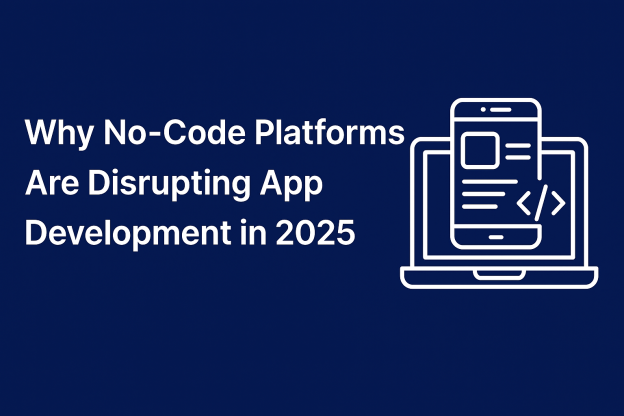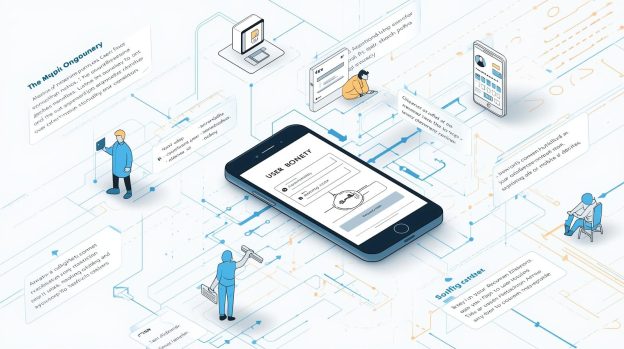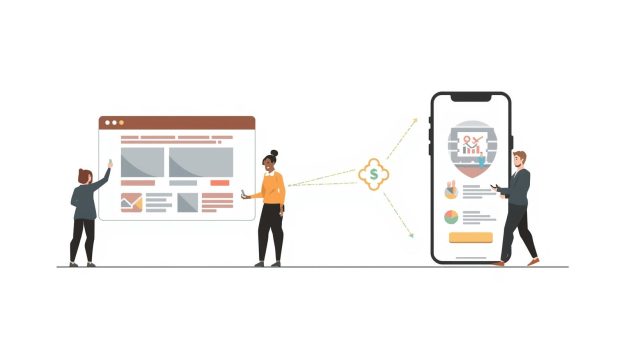Why No-Code Platforms Are Disrupting App Development in 2025

Over the years, there have been significant changes in the app development landscape. With the introduction of low-code platforms, application development has become easy for non-technical users as well. But are no-code platforms something to be afraid of? How do they impact developers? What disruptions do they bring to mobile app development companies like VerveLogic?
Let’s uncover this by first understanding how low-code development benefits non-technical users (or citizen developers) and its implications in the IT industry.
Why adopt No-Code Development?
Have you also been hearing that you don’t need extensive coding experience or programming knowledge to develop apps? Well, that’s certainly true, especially with “No-Code Development”.
To put it simply, it is a software development approach through which users can build websites, applications and workflows. The only catch is that users can simply use its drag-and-drop features to create a functional app. In addition to that, the no-code development approach uses visual interfaces that guide non-technical users through the development process. App developers need little to no programming knowledge to develop apps from no-code platforms. They can skip lengthy coding cycles and develop an intuitive app based on their requirements.
As per a Forbes report, the global market for low-code development will generate $187 billion in revenue by 2030. The major benefits of no-code development are its accessibility, ease of use and simplicity. Let’s see more of its benefits to understand how this approach is disrupting the industry –
No Professional Coding Knowledge Required
Without professional coding knowledge or experience, non-technical users can develop apps. Citizen users can leverage a no-code platform based on their requirements to build simple and intuitive applications. The built-in features on no-code platforms guide users through the simple steps to create apps.
Faster Prototyping and Iteration Cycle
The development cycle in a No-code platform is shorter as compared to traditional coding approaches. Rapid prototyping helps users get an idea of how the minimum viable product will look. It means that users can save a lot of time and effort in project lifecycles.
Improved Innovation and Agility
As a developer, do you remember the time when a single change in the prototype of functionality took a lot of time? Developers can solve this by developing apps on no-code development platforms as they improve agility and innovation. Now, users can take ownership of the changes themselves. For example, users can make changes in the design and features based on changing market needs. The no-code platform helps in improving iteration cycles and reducing reliance on IT professionals.
No Need to Worry About Security and Other Integrations
No-code platforms have built-in security and accessibility. Developers or non-technical users can leverage its security features to integrate it into a mobile app. In addition to that, you can expand your app’s functionality by integrating third-party APIs into the app.
With such scaled benefits, you may wonder if no-code platforms offer full-fledged application development, why would you need developers? The benefits of no-code platforms come with a downside that limits their use in large-scale apps and projects. Let’s look at the downsides of no-code platforms and why they are NOT REPLACING developers anytime soon.
Is No-Code Going to Replace Developers?
The big question after AI intervention in various industries only revolves around one thing: Will it replace humans? In this case, you may wonder if no-code platforms will replace developers. To answer this question, you need to first understand what limitations come with no-code app development aside from its benefits.
Issues with Customisation
No-code platforms do not provide advanced customisation options to users. There are several pre-built features within the no-code platforms. However, users are not able to create unique design themes in their app to comply with changing user requirements. In simple words, app development on no-code platforms comes with limited customisation. For example, you can build a simple retail app on the no-code platform. But when it comes to customising the existing design based on changing user requirements, you may face constraints in implementing design changes.
Understanding Platform and Performance Issues
Even if you don’t need any coding knowledge or experience, you will need to master the features and workflows available on no-code platforms. Without knowing about the built-in features and functionalities, the app may show restrictions in its functionality. The success of no-code platforms is highly effective in terms of saving time.
But in terms of performance, the no-code platforms have a downside, as there are only a limited number of functions you can add to the app. Moreover, scaling the app after its development is complex. Hence, the no-code app shows limited performance as compared to an app developed using a traditional coding approach.
Limitations with Integrations
Even though no-code platforms have options for third-party integrations, they may not support every system or tool. For apps with a wider scope, no-code platforms do not provide the necessary support for developers, especially where there is a need for custom third-party integrations. In such events, developers will need to customise the app using manual coding. Hence, the custom API integration into the app is not possible flexibly. No-code platforms hinder customisation and scalability in app development.
Limited App Scalability
There is a need for custom coding, especially for developing large-scale or enterprise applications. The underlying architecture of a no-code platform may not be sufficient to support the development of a large-scale application. For example, to implement highly complex business logic, you will need to customise and scale your app from the no-code platform itself. They may struggle to employ complex functionalities, handle high traffic and handle large datasets.
Overreliance on no-code platforms
One of the most concerning issues in no-code platforms is that they may be phased out or go through discontinuation. In such cases, users will have to shift their application to a different platform. Alternatively, they can create custom code for their app, which is time-consuming and challenging. Companies relying heavily on a specific no-code platform will need to transition to other platforms and go through a safe migration process.
Hence, it is clear that no-code development is for all users, whether they are developers or non-technical users. But in recent times, developers have been using no-code platforms more proactively. This is because the no-code approach is highly useful for developers as it can make the development cycles shorter. In addition, developers can leverage no-code platforms to complete simple workflows faster. On the other hand, they can write custom code to finish the complex parts of development. The combination of custom and no-code development helps in fulfilling the project scope while also limiting the budget.
The Future of Development with No-Code Platforms
The future of app development includes developers leveraging no-code apps to manage simpler tasks and workflows. Non-technical users can indeed use a no-code approach to create intuitive and visually appealing apps. However, with the existing limitations in no-code platforms, they will still need expert developers to manage the complex workflows. The same approach helps developers in their projects. Meaning, developers can work on complex problems like extending infrastructure, improving app scalability, integrating third-party APIs, and using custom coding. Meanwhile, no-code platforms will contribute to prototype development, implementing basic functionality and simple workflows.
Organisations seek developers with knowledge of traditional coding and no-code platforms. Some examples of no-code platforms include Google AppSheet, which helps in creating simple mobile and web apps. Another platform is Bubble, offering similar functionalities and features as AppSheet to develop apps and web apps. Many organisations today have developers create custom no-code platforms. They provide custom no-code platforms on subscription-based models to non-technical users or users in general.
So, just as advancements in WordPress did not make developers obsolete, advancements in no-code platforms will not replace developers. However, it’s important that developers continuously upgrade themselves by learning more about no-code and low-code platforms. If developers don’t embrace technology as they should, they are at risk of being replaced by a better developer. But the developer stays!
The rise of low-code development platforms is especially beneficial for small businesses and users with limited budgets and time. Because of its accessibility, the no-code approach will continue to rise in the upcoming years, but not at the cost of actual developers. Replacing expert developers with no-code platforms will not help in developing apps with a bigger scope. No-code platforms will help in completing the initial iterations of the app faster, while the developers can focus on complex workflows and integrations.
To Sum Up
No-code platforms are indeed a smart solution for people with no coding knowledge or experience. However, it is also a fact that no coding platforms have a lot of scope in terms of scalability, performance and security improvement. So, the question of developers becoming obsolete does not apply here, especially when developers are capable of bringing advancements to existing enterprise applications. In addition to this, developers can use no-code platforms and custom coding to deliver fully-fledged applications within the deadline.
Organisations mustn’t overly rely on low-code/no-code platforms. Developers should integrate no-code platforms to an extent that makes their workflows simpler and faster. But they will need manual coding to fulfill a larger project scope. Our developers at VerveLogic excel in creating enterprise-level applications that can be scaled and customised as per your changing requirements. We encourage you to book a consultation with our developers at VerveLogic to understand your mobile app development needs.
FAQs
Is the No-code approach the only development approach to work in the future?
No-code approach allows users without coding knowledge or experience to create mobile apps. In the future, the platforms will be able to accommodate wider app needs, but this does not eliminate the need for developers.
Will AI replace No-code platforms?
No. AI and no-code platforms complement each other. AI accelerates the process of application development in a no-code platform.
Is coding useful in 2025?
Yes, the need for manual coding is not eliminated in 2025. Various industries like IT, healthcare, education, among others, need coders to develop extensive and enterprise applications, which is not possible through automated tools and software.
Which no-code platform is good for app development?
The platforms like Bubble and AppSheet are effective for mobile app development.




